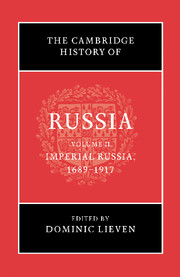Book contents
- Frontmatter
- Introduction
- Part I Empire
- Part II Culture, Ideas, Identities
- Part III Non-Russian Nationalities
- Part IV Russian Society, Law and Economy
- Part V Government
- Part VI Foreign Policy and the Armed Forces
- Part VII Reform, War and Revolution
- 28 The reign of Alexander II: a watershed?
- 29 Russian workers and revolution
- 30 Police and revolutionaries
- 31 War and revolution, 1914–1917
- Bibliography
- Index
- Map 5. The Russian Empire (1913). From Archie Brown, Michael Kaser, and G. S. Smith (eds.) Cambridge Encyclopedia of Russia 1982.">
- Plate Section">
- References
28 - The reign of Alexander II: a watershed?
from Part VII - Reform, War and Revolution
Published online by Cambridge University Press: 28 March 2008
- Frontmatter
- Introduction
- Part I Empire
- Part II Culture, Ideas, Identities
- Part III Non-Russian Nationalities
- Part IV Russian Society, Law and Economy
- Part V Government
- Part VI Foreign Policy and the Armed Forces
- Part VII Reform, War and Revolution
- 28 The reign of Alexander II: a watershed?
- 29 Russian workers and revolution
- 30 Police and revolutionaries
- 31 War and revolution, 1914–1917
- Bibliography
- Index
- Map 5. The Russian Empire (1913). From Archie Brown, Michael Kaser, and G. S. Smith (eds.) Cambridge Encyclopedia of Russia 1982.">
- Plate Section">
- References
Summary
The abolition of serfdom in 1861, under Alexander II, and the reforms which followed (local government reforms, the judicial reform, the abolition of corporal punishment, the reform of the military, public education, censorship and others), were a ‘watershed’, ‘a turning point’ in the history of Russia. This is the verdict of the reformers themselves and their opponents, people who lived at the time in Russia as well as beyond its borders, and many researchers. This theme remains crucial for historians. But in particular periods such as during the 1905 Revolution or Gorbachev’s perestroika, interest in the history of Alexander II’s reforms has acquired a particular topicality and political colouring. At such times instead of the already established term ‘the Great Reforms’, new terminology emerges particularly in the academic literature for wider audiences such as ‘revolution from above’, ‘a revolutionary break with the past’ and ‘coup d’etat’.
However, mainstream scholarship still accepts the more subtle term ‘the Great Reforms’. If the question of the suitability of the term for designating this epoch is unlikely to evoke serious doubts and disagreements, that is not true of the issues raised in the title of this chapter as well as others (including the personal role of Alexander II in the realisation of the reforms, the interconnection among them, their subsequent fate), on which there is no consensus in the academic literature. It is sufficient to refer to contemporary Western and Russian research whose authors consider the boundary between ‘the pre-reforms’ of Nicholas I, ‘the Great Reforms’ of Alexander II and the ‘counter-reforms’ of Alexander III relative and even artificial.
Keywords
- Type
- Chapter
- Information
- The Cambridge History of Russia , pp. 593 - 616Publisher: Cambridge University PressPrint publication year: 2006
References
- 5
- Cited by

